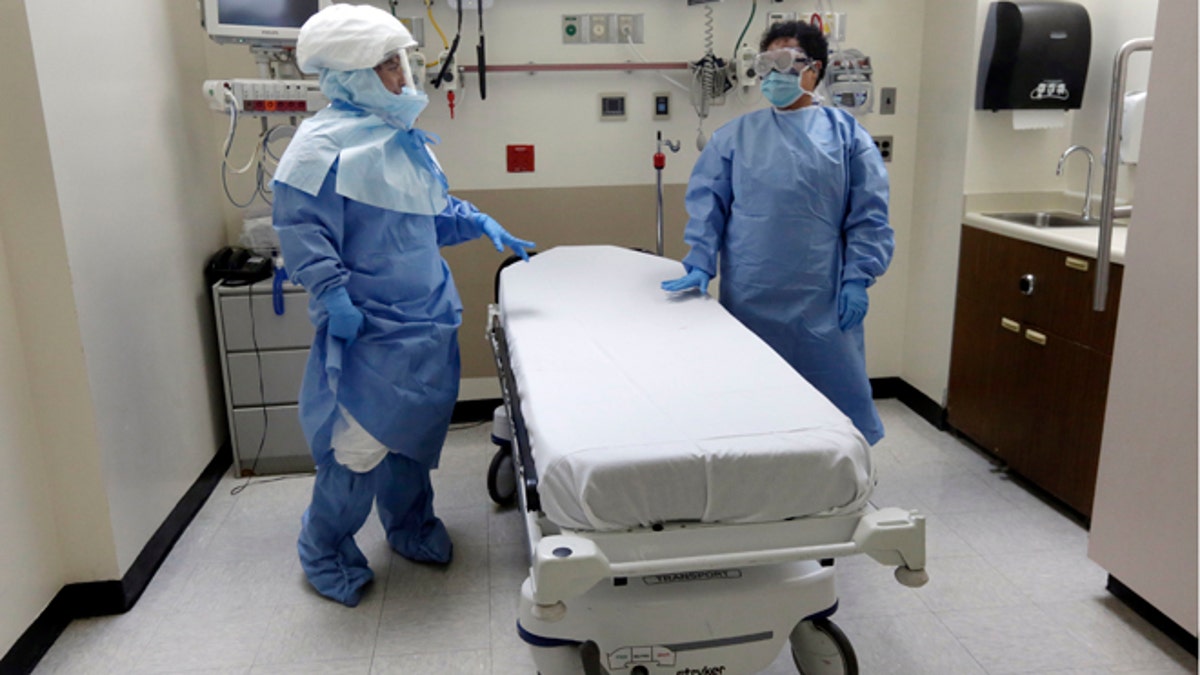
Oct. 8, 2014: Bellevue Hospital nurse Belkys Fortune, left, and Teressa Celia, Associate Director of Infection Prevention and Control, wear protective suits in an isolation room in the Emergency section of the hospital during a demonstration of procedures for possible Ebola patients in New York. (AP/File)
NEW YORK – A nurse who treated Ebola patients in Sierra Leone is the first test case of quarantine policies now in effect in three states over heightened fears the deadly virus could be spread by health care workers returning to the United States.
But the sketchy details of how such quarantines will be handled drew sharp criticism from humanitarian organization Doctors Without Borders while infectious disease experts said many of the logistics about enforcement are likely still up in the air.
Kaci Hickox, a Doctors Without Borders nurse, remained isolated at a hospital Saturday, a day after she returned to the U.S. and the governors of New York, New Jersey and Illinois announced mandatory 21-day quarantines for arriving travelers who had contact with Ebola patients in West Africa.
Health officials said Hickox was transported to a hospital after running a fever, but the nurse told the Dallas Morning News she was merely flushed because she was upset by a quarantine process she described as treating her like a criminal.
"This is not a situation I would wish on anyone, and I am scared for those who will follow me," Hickox wrote in an essay for the newspaper.
Health officials said preliminary tests for Ebola come back negative for Hickox but Newark University Hospital would not say if she would be released for the balance of the quarantine period or remain in the hospital.
Doctors Without Borders executive director Sophie Delaunay complained about the "notable lack of clarity" from state officials about the quarantine policies.
"We are attempting to clarify the details of the protocols with each state's departments of health to gain a full understanding of their requirements and implications," she said in a statement.
The aid organization said Hickox has not been issued an order of quarantine specifying how long she must be isolated and is being kept in an unheated tent. It urged the "fair and reasonable treatment" of health workers fighting the Ebola outbreak.
Indeed, health officials in all three states with quarantine policies did not return messages Saturday from The Associated Press seeking details about enforcement.
Dr. Irwin Redlener, a Columbia University professor and director of the New York-based Director National Center for Disaster Preparedness, said the logistics of such a policy are "a problem."
"The challenge now is how you translate this quarantine plan to operational protocol," said Redlener, who has been involved in discussions with New York City Mayor Bill de Blasio and New York Gov. Andrew Cuomo on who should be under home quarantine and how to monitor them. That could involve case managers who keep an eye on home-bound people, Redlener said.
Cuomo and New Jersey Gov. Chris Christie on Friday imposed a quarantine of 21 days — the incubation period of the deadly virus — on travelers who have had contact with Ebola patients in the countries ravaged by the virus — Liberia, Guinea and Sierra Leone. A similar measure was announced in Illinois, where officials say such travelers could be quarantined at home.
The quarantine measures were announced after a New York physician working for Doctors Without Borders returned from Guinea was admitted to Manhattan's Bellevue Medical Center earlier this week to be treated for Ebola.
Michael Osterholm, an infectious disease epidemiologist and biosecurity expert at the University of Minnesota, said any quarantine should be based on the fact that Ebola can only be transmitted when a person has symptoms of the disease.
"All of us in public health would agree that we don't want to have Ebola patients infecting others, but we also have to base how we stop that on the science we know," Osterholm said. "This quarantine hasn't truly been defined. What do we mean by this?"
He noted that even a person who had been in contact with an Ebola patients becomes infectious only after manifesting symptoms of sickness such as an elevated temperature. And even then, he said, Ebola is transmitted only through bodily fluids.
But Redlener said the point of quarantine is not to find people who have symptoms. "It's people who have had some kind of contact, and until we can establish that they don't have Ebola, we don't want them to be walking around."
Osterholm and Redlener warned that quarantines might discourage doctors and nurses from going to West Africa to help, an issue raised by aid groups and Dr. Rick Sacra, one of the American health care workers successfully treated for Ebola contracted while he worked in Liberia.
"Until Ebola is under control in Africa, we're never going to see the end of such cases coming to the United States," Redlener said.
